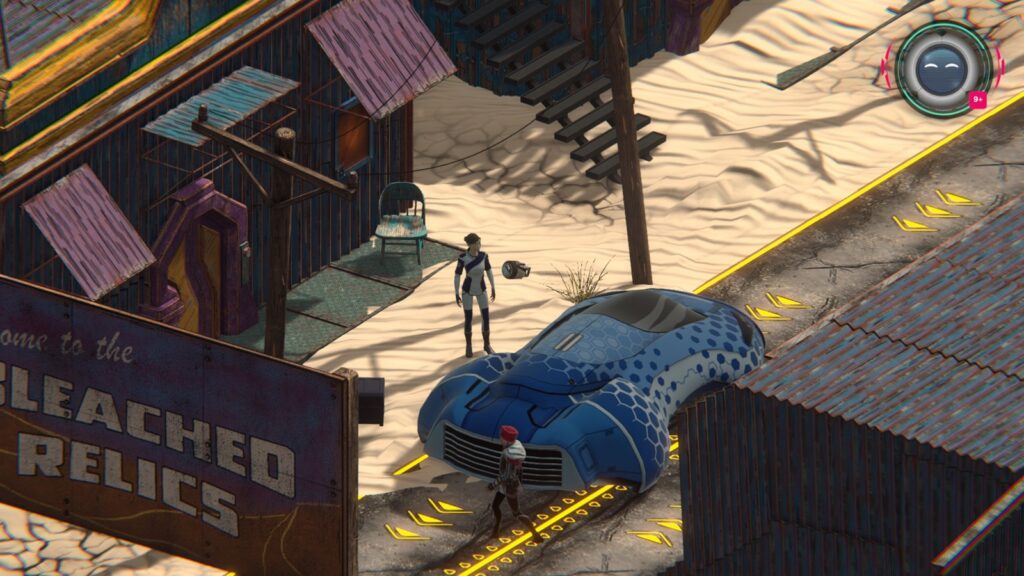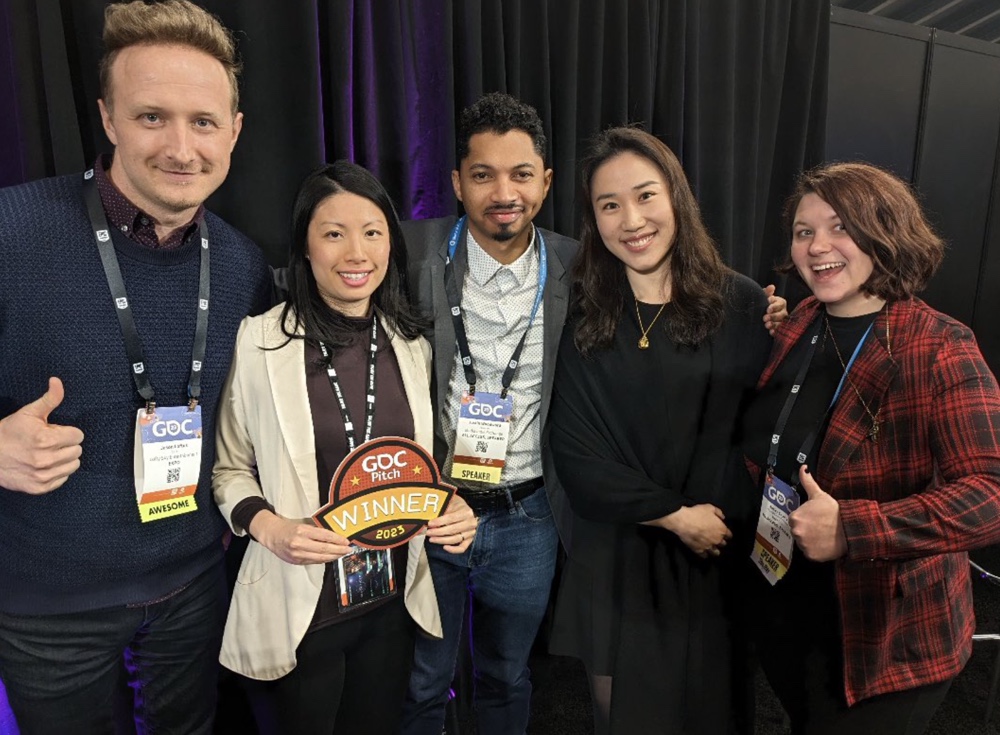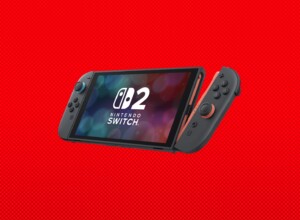Pitching a game to a publisher is a daunting experience. It’s the stage of development where artistic aspirations are tested by commercial concerns.
Pitching a game to a packed hall of judges, developers, investors, industry peers, students, and journalists brings another level of pressure – and an expectation that feedback will be varied.
For Toronto-based Lofty Sky Entertainment, that experience was happily positive. At this year’s Game Developers Conference, the studio’s upcoming game won GDC Pitch, an event designed to help independent studios hone their pitching skills.
Sky of Tides is a science-fiction RPG set in the world of Numen, a planet splintered by cataclysmic events into nine pieces. It follows the journey of Rin, the daughter of a missing researcher who uncovers a dark secret. It’s a personal tale set against the backdrop of life-changing – and world-shattering – events. Sky of Tides echoes the likes of Disco Elysium, partly because of gameplay that emphasizes conversation over combat but also because of its isometric, comic-book visuals.
Following the game’s success at GDC Pitch, we spoke to creative director Judith Cheung about the creation of Sky of Tides and the studio’s background.

“We do everything from documentaries to television, to animation, VR, and games,” says Cheung. “We play with a lot of different mediums, but what connects all the mediums is a love of storytelling.”
Lofty Sky Entertainment emerged from a passion for documentary filmmaking and human rights, with a focus on religious and spiritual persecution. The studio is led by Jason Loftus, a Peabody Award-winning producer on Human Harvest, a documentary about the illegal organ harvesting trade in China.
“Following Human Harvest, there was a level of trust within the dissident community,” Cheung explains. “So we started to produce more documentaries about the different human rights abuses that are happening in China.”
Most recently, Lofty Sky received acclaim for Eternal Spring, an animated documentary featuring the work of Chinese artist Daxiong. It tells the story of Falun Gong practitioners who took over a TV station in 2002 to protest against the propaganda being spread about their group. The film was selected as Canada’s official submission to the 2023 Oscars and won the Grand Jury Prize at the Banff World Media Festival Rockie Awards.

Compared to the real-world topics that the studio explores in film, the sci-fi exploits of Sky of Tides might appear somewhat inconsequential.
“We do a lot of different things and games are just one aspect of what we do. And it’s probably the lighter side of what we do,” Cheung admits. “Sky of Tides is very much a sci-fi world. A broken world on the brink of war and destruction. But our next game will combine our love for documentaries and love for human rights into a narrative game.”
Cheung emphasises the importance of selecting the right medium to effectively convey a story. “Sometimes it makes sense for it to be told as a film or movie, but sometimes we feel that you can go more in-depth if there’s more interaction in the medium. A lot of it has to do with the audience. Documentary has a very specific audience, but games have a different – and much wider – audience.”
Another example is the five-episode television series that will accompany Sky of Tides. “That’s a linear format, but it’s all set in the same world,” says Cheung, “There’s overlap in the characters, but it’s from the point of view of another protagonist on the other side of the conflict.”

Sky of Tides‘ emphasis on exploration, dialogue, and choice means the world of Numen and its characters have to resonate for the game to succeed. However, Cheung is also clear that the narrative needs to be supported by compelling gameplay. It’s a delicate balance.
“It’s very story driven. It’s got some light RPG mechanics. The choices you make and your character points are shaping your character, and we’re looking at consequences at the end, depending on the type of stats that you have,” Cheung explains. “We find the storytelling the easy part. I think the challenge is in the execution. In terms of the game side, we’re not all game developers by trade, so for us, it’s understanding how to put the game mechanics first and then write the story to complement the game mechanics. I think that’s where the challenge is.”
“The beauty of going to GDC Pitch was that I had to make a five-minute pitch, and I can now use that in every single meeting.”
Given the studio’s plans for the Numen universe, it was important to fill out the backstory of its history and people. Much of this was developed with the game’s former creative director, Lina Skorbach.
“I feel that she tapped into another dimension. It’s so rich,” Cheung says. “She has an answer for everything. She has the backstory for how the entire planet was created, the different technologies, the laws, and the way the colours of the different nations correspond to their eye colours. It was overwhelming how much detail we had about this world. So for us, it was kind of like downloading all of that and systematising it in a way that we could disseminate that information to the rest of the team. I have this 40-page bible about the world because there’s just so much information.”
If Sky of Tides is successful, Lofty Sky intends to produce additional episodes of the game, each dedicated to exploring aspects of Numen’s fragmented nations through the eyes of a different protagonist.

Condensing the essence and ambition of Sky of Tides into a concise five-minute pitch seems like a daunting prospect. Cheung says that the feedback received from GDC Pitch was invaluable, not just in terms of showcasing the game on stage but also in gaining insights into the expectations of publishers and investors.
“The judges would tell you if something was missing from your pitch. It was constructive. The beauty of going to GDC Pitch was that I had to make a five-minute pitch, and I can now use that in every single meeting. The feedback has been very constructive, and has confirmed some of our assumptions about what people love about the game and what we need to improve. We feel like it’s something special, so we’re excited. It’s been really positive.”
Cheung hopes that players will respond with the same enthusiasm and positivity once they get their hands on the game.
“It’s a bit nerve-wracking. It’s scary to put something out into the world and people can love it or hate it or whatever. I’m just really excited for people to get in the world. Once they do, they’ll really fall in love with the characters. There’s so much to explore, and I hope people will play the game and watch the series because then they’ll see how vast this whole universe we’ve created is.”






